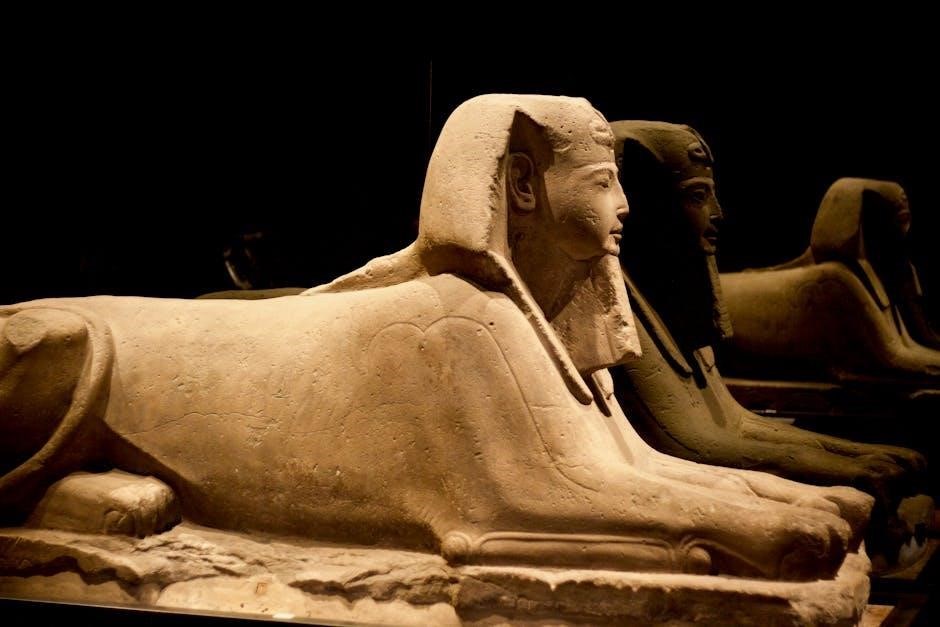Historiography explores how history is recorded, interpreted, and reshaped over time, reflecting evolving methods, biases, and philosophical perspectives․ It examines the credibility of sources and historians’ roles in shaping narratives, emphasizing the dual nature of history as both repetitive and unique․
Definition and Scope of Historiography
Historiography is the study of how history is written, interpreted, and reshaped over time․ It examines the methodologies, sources, and philosophical perspectives historians use to construct narratives․ Historiography’s scope includes analyzing the credibility of sources, the intentions of historians, and the cultural or ideological biases that influence historical accounts․ It also explores the evolution of historical writing, from ancient times to contemporary approaches, highlighting how different eras and societies have understood and represented the past․ This field bridges the gap between history and its interpretation, offering insights into the dynamic nature of historical knowledge․
Traditional Approaches to Historiography
Traditional historiography focuses on chronological narratives, often emphasizing political, military, and diplomatic events․ It relies on primary sources like documents and archival records, prioritizing accuracy and objectivity․ Early historians such as Herodotus and Thucydides laid the groundwork, while later scholars like Gibbon and Ranke refined methods․ This approach seeks to reconstruct the past “as it actually was,” minimizing personal bias and emphasizing factual precision․ It has been criticized for its narrow focus but remains foundational to historical scholarship․
Modern Trends in Historiography
Modern historiography emphasizes interdisciplinary approaches, integrating insights from sociology, anthropology, and cultural studies․ It shifts focus from elite narratives to everyday lives, prioritizing social and cultural histories․ Digital tools and digitized archives enable new research methods, fostering collaboration․ Postcolonial and feminist perspectives challenge traditional Eurocentric views, promoting inclusivity․ Global history emerges as a key area, exploring connections across regions․ These trends encourage diverse interpretations and question historical objectivity, reflecting the complexity of the past and its relevance to contemporary issues․

Historical Development of Historiography
Historiography evolved from ancient chronicles to modern analytical methods, shaped by cultural, philosophical, and technological advancements across centuries, reflecting changing views of the past and its interpretation․
Ancient and Medieval Historiography
Ancient and medieval historiography laid the groundwork for historical writing, blending myth, chronicle, and philosophical reflection; Early historians like Herodotus and Thucydides in Greece, and Sima Qian in China, sought to record events with varying degrees of objectivity․ Medieval historiography, influenced by religious frameworks, often focused on divine providence and moral lessons, as seen in works by Bede and medieval chroniclers․ This period emphasized the recording of events for communal memory and ethical guidance, shaping historical narratives within cultural and religious contexts․
Renaissance and Enlightenment Periods
The Renaissance revived classical learning, influencing historians like Petrarch and Machiavelli, who emphasized humanism and civic virtue․ The Enlightenment brought rational inquiry, with thinkers like Voltaire and David Hume applying skepticism and analyzing historical progress․ This era marked a shift from religious narratives to secular perspectives, focusing on human agency and philosophical ideas․ Historians began to seek patterns and causes, laying the groundwork for modern historical analysis and the pursuit of objectivity in understanding the past․
19th and 20th Century Historiographical Trends
The 19th century saw the rise of professional historiography, with historians like Leopold von Ranke emphasizing empirical research and objectivity․ The 20th century introduced diverse methodologies, including Marxist, social, and cultural approaches․ The Annales School focused on long-term structural history, while postcolonial and feminist perspectives challenged traditional narratives․ Digital tools emerged, transforming research and accessibility․ These shifts reflected broader intellectual and societal changes, expanding the scope of historical inquiry and fostering debates about objectivity, interpretation, and the role of history in understanding human experiences․

Theoretical Foundations of Historiography
Historiography’s theoretical foundations explore frameworks like positivism, Marxism, and postmodernism, shaping how historians interpret evidence and construct narratives, reflecting evolving philosophical and methodological approaches to understanding the past․
Philosophy of History and Its Impact
The philosophy of history examines the meaning and purpose of historical events, shaping how historians interpret the past․ Influential thinkers like Hegel and Marx proposed grand narratives, while others questioned such frameworks․
These philosophical ideas deeply impact historiography, influencing methodologies and interpretations․ They challenge historians to consider broader themes, such as progress, causality, and human agency, enriching historical analysis and its relevance to society․
Schools of Thought in Historiography
Historiography encompasses diverse schools of thought, each offering unique perspectives on historical analysis․ Positivism emphasizes empirical evidence and objectivity, while Marxism focuses on economic and social structures․ The Annales School highlights long-term social and cultural patterns over events․ Postmodern historiography challenges traditional notions of objectivity, emphasizing narrative constructs․ These schools shape methodologies and interpretations, reflecting varying philosophical underpinnings and intellectual traditions, thus enriching the discipline’s complexity and adaptability to changing intellectual climates․
Role of Evidence and Sources in Historiography
Evidence and sources are central to historiography, forming the foundation for historical inquiry․ Primary sources, such as documents, artifacts, and eyewitness accounts, provide direct insights into the past․ Secondary sources, like scholarly interpretations, build upon these materials․ Historians critically evaluate sources for authenticity, reliability, and context to construct coherent narratives․ The interpretation of evidence is inherently challenging, as sources may reflect biases or omit perspectives․ Advances in technology have expanded access to diverse sources, enabling deeper and more inclusive historical analysis, while maintaining rigorous academic standards ensures credibility․

Key Concepts in Historiography
Historiography involves analyzing themes like causation, change, continuity, and context to interpret the past, shaping historical narratives through evidence-based methodologies and theoretical frameworks․
Objectivity and Subjectivity in Historical Writing
Historiography grapples with the tension between objectivity and subjectivity, as historians strive to present accurate accounts while acknowledging personal and cultural biases․ Objectivity aims for impartial interpretation of evidence, but subjectivity inevitably influences narrative choices․ The historian’s perspective, shaped by their context, can color how events are framed and analyzed; Balancing these forces is crucial for credible historical writing, ensuring that interpretations remain grounded in evidence while recognizing the inherent subjectivity of human understanding․ This duality underscores the complexity of reconstructing the past․
Historical Context and Bias
Historical context profoundly shapes interpretations, as historians analyze events within specific temporal and spatial frameworks․ Bias, whether conscious or unconscious, influences how evidence is selected and narratives are constructed․ Cultural, social, and political contexts of both the past and present can skew perspectives․ Recognizing these biases is essential for nuanced understanding, as historians strive to balance empathy for historical actors with critical analysis․ Contextual awareness enhances the credibility of historical interpretations, fostering a more comprehensive understanding of past events and their relevance today․
The Role of the Historian in Shaping Narratives
Historians play a pivotal role in shaping historical narratives by interpreting and synthesizing evidence․ They act as storytellers, selecting and framing events to convey meaning․ Their perspectives, influenced by cultural, social, and political contexts, shape how the past is presented․ Historians must balance objectivity with interpretative insights, ensuring narratives remain grounded in evidence while addressing broader themes․ Their work not only informs understanding of the past but also influences contemporary views, making their role both interpretative and transformative in shaping collective memory and historical consciousness․

Contemporary Approaches to Historiography
Contemporary historiography emphasizes diverse perspectives, challenging traditional narratives through postmodern, digital, and interdisciplinary methods, fostering a more inclusive understanding of historical events and experiences globally․
Postmodern and Postcolonial Historiography
Postmodern historiography critiques grand narratives and objective truths, emphasizing fragmented perspectives and subjective interpretations․ It challenges traditional notions of historical accuracy, advocating for diverse voices and pluralistic accounts․ Postcolonial historiography focuses on decolonizing history, highlighting marginalized experiences and questioning Eurocentric frameworks․ Both approaches redefine how historians engage with sources, promoting inclusivity and critical analysis․ They encourage a reevaluation of power dynamics, cultural contexts, and representation in historical narratives, offering fresh insights into the complexities of the past and its contemporary relevance․
Digital Historiography and New Technologies
Digital historiography leverages new technologies to transform historical research and presentation․ Tools like digital archives, big data analysis, and software for textual or visual analysis enable historians to explore vast datasets․ Virtual reality and interactive platforms create immersive historical experiences, while digital collaboration fosters global research networks․ These technologies expand accessibility and innovation, though they also pose challenges like data overload and the need for critical digital literacy․ Digital methods are reshaping how historians engage with the past, offering dynamic and inclusive approaches to historical inquiry and dissemination․
Interdisciplinary Approaches to History
Interdisciplinary approaches integrate history with disciplines like sociology, anthropology, and economics, offering a holistic understanding of historical phenomena․ By combining methodologies from multiple fields, historians gain deeper insights into social structures, cultural dynamics, and economic systems․ This approach challenges traditional narratives, fostering a more nuanced and multifaceted view of the past․ It encourages collaboration and innovation, blending quantitative and qualitative methods to address complex historical questions․ Interdisciplinary approaches enrich historical inquiry by bridging gaps between diverse fields and perspectives, promoting a richer, more comprehensive understanding of human experiences․

Global and Comparative Historiography
Define global and comparative historiography as the study of historical events across regions, emphasizing patterns, connections, and unique developments worldwide, fostering a broader historical understanding․
Comparative Methods in Historical Analysis
Comparative methods in historical analysis involve systematic comparison of historical events, societies, or processes across different regions or periods․ These methods help identify patterns, differences, and connections, fostering a deeper understanding of historical phenomena․ By analyzing similarities and contrasts, historians can develop broader theories or challenge existing ones․ Comparative approaches require careful consideration of diverse sources and cultural contexts to avoid biases and ensure valid comparisons․ This methodology enhances historical insights by revealing universal trends and unique characteristics, enriching our understanding of the past․
Global History and Its Challenges
Global history examines historical processes and connections across the world, transcending national or regional boundaries․ It emphasizes shared experiences, such as trade, migration, and cultural exchange, while highlighting global phenomena like imperialism and industrialization․ Challenges include integrating diverse sources, balancing local and global perspectives, and addressing Eurocentrism․ Historians must navigate varying historical periods and geographies to synthesize coherent narratives․ Despite these complexities, global history offers a holistic understanding of human experiences, fostering cross-cultural insights and a broader appreciation of historical interdependence․
Regional Historiographies and Their Significance
Regional historiographies focus on the historical narratives and interpretations specific to particular geographic or cultural areas․ They often reflect the unique experiences, traditions, and perspectives of a region, shaped by local languages, cultures, and historical events․ These historiographies provide insights into how different societies construct their past, offering diverse viewpoints that enrich global historical understanding․ By studying regional approaches, historians can identify common themes and variations, fostering a more nuanced appreciation of historical diversity and its relevance to contemporary societies․

Practical Applications of Historiography
Historiography informs policy, education, and public memory, shaping how societies understand their past and make informed decisions for the future through critical analysis of historical narratives․
Historiography in Education and Research

Historiography plays a vital role in education and research by shaping how history is taught and studied․ It encourages critical thinking through the analysis of diverse historical interpretations and methodologies․ In academic settings, historiography helps students and scholars understand the evolution of historical thought, fostering a deeper comprehension of the past․ By examining various approaches and debates, it promotes interdisciplinary research and enriches our understanding of historical narratives, making history more accessible and engaging for learners at all levels․
The Role of Historiography in Policy-Making
Historiography significantly influences policy-making by providing historical context to inform decisions․ Policymakers often rely on historical analyses to understand the roots of current issues, such as economic trends, social movements, or international relations․ By examining past policies and their outcomes, historians help identify patterns and lessons, enabling more informed and effective decision-making․ However, the interpretation of historical data can also introduce bias, emphasizing the need for objective analysis․ Historiography thus serves as a bridge between the past and present, shaping strategies for future governance and development․
Public History and Its Impact on Society
Public history bridges the gap between academic historiography and societal engagement, making history accessible to broader audiences․ It encompasses museums, documentaries, and community projects, fostering a collective understanding of the past․ By engaging the public, it democratizes history, enabling individuals to connect with their heritage․ This approach not only educates but also shapes identity and cultural awareness․ Public history’s impact lies in its ability to inspire reflection, promote inclusivity, and influence societal values, ensuring history remains relevant in contemporary life․

Ethical Considerations in Historiography
Historians must uphold accuracy, objectivity, and truthfulness, avoiding bias and misrepresentation․ Ethical practices ensure credible narratives, fostering trust and integrity in historical scholarship and public discourse․
Truth and Accuracy in Historical Writing
Historians must prioritize truth and accuracy by basing their work on credible evidence and rigorous methodologies․ The pursuit of truth involves interpreting sources objectively, considering context and potential biases․ Accuracy ensures reliable narratives, free from distortions․ Challenges arise with incomplete or biased sources, requiring critical analysis for balanced interpretations․ Truth and accuracy are vital for historical integrity, fostering trust and ensuring credible accounts that inform and educate effectively, thereby upholding the discipline’s reputation․
Addressing Bias and Misrepresentation
Bias and misrepresentation are inherent challenges in historiography, often stemming from cultural, social, or political influences․ Historians must critically evaluate sources to identify and mitigate biases, ensuring balanced interpretations․ Diverse perspectives and primary sources help counteract misrepresentation․ Additionally, acknowledging the historian’s own positionality is crucial for transparency․ By addressing these issues, historiography can strive for fairness, inclusivity, and representation of marginalized voices, fostering a more comprehensive understanding of the past and its complexities, ultimately enriching historical narratives with depth and accuracy․
The Responsibility of Historians in Society
Historians bear the responsibility of uncovering and interpreting the past accurately, ensuring their work informs and educates society․ They must strive for objectivity, avoiding the imposition of modern values on historical events․ Preserving cultural heritage and promoting critical thinking are essential roles․ Historians also have a duty to challenge myths and misinformation, fostering a well-informed public․ Their ethical obligation to truth and accuracy ensures history serves as a foundation for understanding and shaping a more informed future, bridging the past with present societal needs and challenges․

Future of Historiography
The future of historiography lies in embracing digital tools, interdisciplinary approaches, and global perspectives, ensuring history remains accessible and relevant in an evolving world․
Emerging Trends and Technologies
Emerging trends in historiography include the integration of digital tools, computational methods, and big data analysis to process vast historical datasets․ Machine learning algorithms are being used to identify patterns and trends in large-scale historical records․ Digital humanities and virtual reality are creating immersive experiences, making history more accessible․ Open-access platforms are democratizing historical knowledge, while collaborative projects foster global scholarly engagement․ These technologies are reshaping how historians conduct research, interpret sources, and present findings, ensuring historiography remains dynamic and innovative in the digital age․
Challenges and Opportunities in the Digital Age
The digital age presents both challenges and opportunities for historiography․ The proliferation of digital sources raises issues of authenticity and overload, while AI tools offer innovative ways to analyze data․ Digital preservation ensures access to historical records but requires robust infrastructure․ Historians must adapt to new methodologies while maintaining critical rigor․ Collaborative digital projects enable global scholarship but also pose challenges in coordinating diverse perspectives․ Balancing tradition with innovation is key to harnessing the potential of digital historiography effectively․
The Evolution of Historical Thought
Historical thought has evolved significantly over time, shaped by changing intellectual frameworks and societal values․ Early historians often focused on chronicling events, while later scholars incorporated philosophical and social analyses․ The Enlightenment emphasized reason and empiricism, laying the groundwork for modern historiography․ The 19th century saw the rise of scientific history, while the 20th century introduced diverse perspectives like Marxism, feminism, and postcolonialism․ Today, historians continue to refine their approaches, integrating global and interdisciplinary insights․ This evolution reflects the dynamic nature of understanding the past;